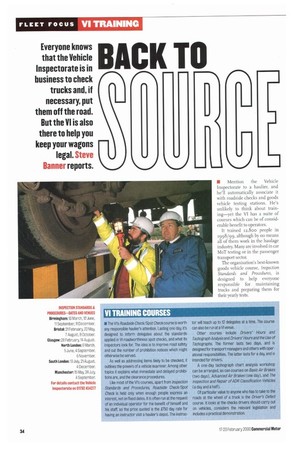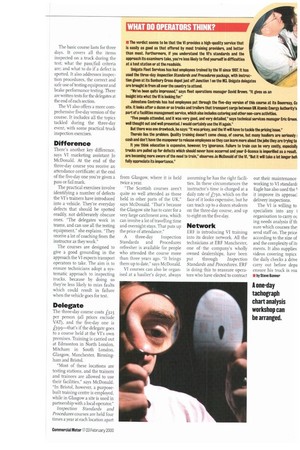Everyone knows that the Vehicle Inspectorate is in business to
Page 36

Page 37

If you've noticed an error in this article please click here to report it so we can fix it.
check trucks and, if necessary, put them off the road. But the VI is also there to help you keep your wagons legal. Steve Banner reports. IN Mention the Vehicle Inspectorate to a haulier, and he'll automatically associate it with roadside checks and goods vehicle testing stations. He's unlikely to think about training—yet the VI has a suite of courses which can be of considerable benefit to operators.
It trained 12,800 people in 1998/99, although by no means all of them work in the haulage industry. Many are involved in car MoT testing or in the passenger transport sector.
The organisation's best-known goods vehicle course, Inspection Standards and Procedures, is designed to help everyone responsible for maintaining trucks and preparing tli( n for their %reariv tts
The basic course lasts for three days. It covers all the items inspected on a truck during the test; what the pass/fail criteria are; and what to do if a defect is spotted. It also addresses inspection procedures, the correct and safe use of testing equipment and brake performance testing. There are written tests for the delegates at the end of each section.
The VI also offers a more comprehensive five-day version of the course. It includes all the topics tackled during the three-day event, with some practical truck inspection exercises.
Difference
There's another key difference, says VI marketing assistant Jo McDonald. At the end of the three-day course you receive an attendance certificate; at the end of the five-day one you're given a pass or fail mark.
The practical exercises involve identifying a number of defects the VI's trainers have introduced into a vehicle. They're everyday defects that should be spotted readily, not deliberately obscure ones. "The delegates work in teams, and can use all the testing equipment," she explains. "They receive a lot of coaching from the instructor as they work."
The courses are designed to give a good grounding in the approach the VI expects transport operators to take. The aim is to ensure technicians adopt a systematic approach to inspecting trucks, because by doing so they're less likely to miss faults which could result in failure when the vehicle goes for test.
Delegate
The three-day course costs /325 per person (all prices exclude VAT), and the five-day one is L599—that's if the delegate goes to a course held at the VI's own premises. Training is carried out at Edmonton in North London, Mitcham in South London, Glasgow, Manchester, Birmingham and Bristol.
"Most of these locations are testing stations, and the trainers and trainees are allowed to use their facilities," says McDonald. In Bristol, however, a purposebuilt training centre is employed, while in Glasgow a site is used in partnership with a local operator."
Inspection Standards and Procedures courses are held four times a year at each location apart
from Glasgow, where it is held twice a year.
"The Scottish courses aren't quite so well attended as those held in other parts of the UK," says McDonald. "That's because the Glasgow site has to cater for a very large catchment area, which can involve a lot of travelling time and overnight stays. That puts up the price of attendance."
A three-day Inspection Standards and Procedures refresher is available for people who attended the course more than three years ago. "It brings them up to date." says McDonald.
VI courses can also be organised at a haulier's depot, always
assuming he has the right facilities. In these circumstances the instructor's time is charged at a daily rate of i75o , which on the face of it looks expensive, but he can teach up to a dozen students on the three-day course, and up to eight on the five-day.
Network
ERF is introducing VI training into its dealer network. All the technicians at ERF Manchester, one of. the company's wholly owned dealerships, have been put through Inspection Standards and Procedures. ERF is doing this to reassure operators who have elected to contract out their maintenance working to VI standards Eagle has also used the it improve its approacl delivery inspections.
The VI is willing to specialists into any organisation to carry ou ing needs analysis if th sure which courses the' send staff on. The price according to the size of and the complexity of its ments. It also supplies videos covering topics the daily checks a drive carry out before depa ensure his truck is roa
by Steve Banner








































































































